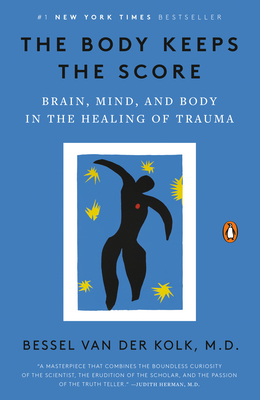
Trauma-Sensitive Mindfulness: Practices for Safe and Transformative Healing
Description
"[A] rare combination of solid scholarship, clinically useful methods, and passionate advocacy for those who have suffered trauma." —Rick Hanson, PhD, author of Buddha's Brain: The Practical Neuroscience of Happiness, Love, and Wisdom
From elementary schools to psychotherapy offices, mindfulness meditation is an increasingly mainstream practice. At the same time, trauma remains a fact of life: the majority of us will experience a traumatic event in our lifetime, and up to 20% of us will develop posttraumatic stress. This means that anywhere mindfulness is being practiced, someone in the room is likely to be struggling with trauma.
At first glance, this appears to be a good thing: trauma creates stress, and mindfulness is a proven tool for reducing it. But the reality is not so simple.
Drawing on a decade of research and clinical experience, psychotherapist and educator David Treleaven shows that mindfulness meditation—practiced without an awareness of trauma—can exacerbate symptoms of traumatic stress. Instructed to pay close, sustained attention to their inner world, survivors can experience flashbacks, dissociation, and even retraumatization.
This raises a crucial question for mindfulness teachers, trauma professionals, and survivors everywhere: How can we minimize the potential dangers of mindfulness for survivors while leveraging its powerful benefits?
Trauma-Sensitive Mindfulness offers answers to this question. Part I provides an insightful and concise review of the histories of mindfulness and trauma, including the way modern neuroscience is shaping our understanding of both. Through grounded scholarship and wide-ranging case examples, Treleaven illustrates the ways mindfulness can help—or hinder—trauma recovery.
Part II distills these insights into five key principles for trauma-sensitive mindfulness. Covering the role of attention, arousal, relationship, dissociation, and social context within trauma-informed practice, Treleaven offers 36 specific modifications designed to support survivors’ safety and stability. The result is a groundbreaking and practical approach that empowers those looking to practice mindfulness in a safe, transformative way.
Praise for Trauma-Sensitive Mindfulness: Practices for Safe and Transformative Healing
Trauma-Sensitive Mindfulness is an especially important guide for safely adapting mindfulness and meditation practices for people who have experienced trauma. . . . [P]ractical, well-organized, and will undoubtedly help clinicians be more cautious and effective when using mindfulness approaches with clients who have trauma histories.
— The Journal of Contemporary Psychotherapy
As soon as I finished reading this book, I began suggesting it to friends who are counselors as well as yoga teachers. . . . This book is an exceptional resource for therapists that includes case examples which offer an excellent overview of trauma and its effects. . . . I am grateful for the work that Treleaven is doing and that he has shared this insightful, caring, and valuable book.
— Psych Central
A seminal work of
outstanding scholarship. . . . [I]mpressively informative,
exceptionally well written, organized and presented so as to be of enduring
value for both academia and the non-specialist general reader with an interest
in the subject.
— Midwest Book Review
Meditation is sweeping through our culture, offering unprecedented potential for healing our psyches and transforming consciousness. Yet, like all powerful processes, if not well understood it can be misused and cause damage. This is particularly the case for those who are living with trauma. In his groundbreaking exploration of meditation and trauma, David Treleaven looks at this issue through multiple lenses, drawing on current research about the physiology and psycho-neurology of unprocessed trauma, and shining a light on the potential impact of a well articulated, popular, and highly regarded form of mindfulness meditations called Vipassana, or Insight meditation. This is essential and fascinating reading for meditation teachers, mental health practitioners, and all those who have suffered from trauma and want to engage on a meditative path in a wise and healing way.
— Tara Brach, PhD, author, Radical Acceptance and True Refuge
David’s writing connects our inner and outer
work. It locates mindfulness amidst the real, lived experiences of the
people practicing. He acknowledges the trauma that so many of us
experience, and the healing that so many need. And, as few in the
meditation world do, David reveals the reality and impact of social inequities,
and how they are at play in mindfulness training and practice, and trauma
healing.
— Staci Haines, author of Healing Sex: A Mind-Body Approach to Healing Sexual Trauma
In this highly readable, sensitive, and respected volume, David Treleaven illuminates the hidden risks of mindfulness and meditation for those who have backgrounds of unresolved trauma. At the same time he offers practical ad protective strategies which greatly expands the reach of these vital practices to populations that previously were unable to benefit from them. Teachers of mindful practices, including meditation and yoga, as well as helping professionals of all sorts who endeavor to weave mindful practice into their work, will all find the wisdom in this book essential for helping traumatized students and clients.
— Babette Rothschild, MSW, author, The Body Remembers, Volumes 1 & 2
David Treleaven's book offers a timely and important contribution to understanding the scope and efficacy of mindfulness practices...Treleaven has carried out both academic research and clinical investigations over decades into how to make mindfulness safe for trauma survivors, and this is the fruit of his work...This is an informative and readable book, which is evidence-based, full of scholarly research, as well as lively illustrative case stories and important, practical therapeutic wisdom.
— Human Givens













